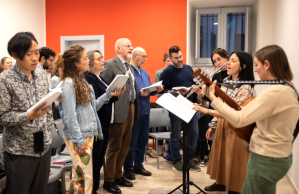
A church in Rome that meets in a former shop is appealing a Supreme Court ruling that they pay thousands of dollars in taxes because the worship site is for commercial use only.
The Breccia di Roma evangelical church is appealing to the European Court of Human Rights after the Supreme Court backed the Italian Tax Authority’s position that the former shop is not for faith-related activities, according to legal rights group Alliance Defending Freedom (ADF) International.
The church suffered discrimination after a request to use the former shop for worship was denied on grounds of appearance, according to an ADF International press statement.
Leonardo De Chirico, president of the church, questioned the tax agency’s authority to decide the aesthetics of a place of worship.
“Our small space in the midst of Rome is the place of worship for our community,” he said. “Our worship doesn’t require specific architecture.”
The accrued tax has been levied only “because we are Protestants,” and the church intended to challenge “this unjust discrimination” at the European Court of Human Rights, De Chirico said.
“We don’t make money – we bring people together closer to Christ,” De Chirico said, acknowledging the church building could not compare to other architecturally beautiful places of worship in Rome. He said the church met in a “comparatively unspectacular building” because of low resources.
“But why would a state punish us for that?” he said. “Our church is not worse or less spiritual just because our architecture is different.”
The former shop was bought and remodeled by the church in 2015.
The Ministry of Cultural Heritage, Activities and Tourism gave permission for the site to be reclassified as a church on the condition of no “internal or external work.” This decision allowed a tax exemption, according to ADF International.
The Italian Tax Agency, however, denied this reclassification after inspecting the property and demanded 11,000 Euros ($11,953 USD) in accrued taxes.
In response, the church filed a lawsuit against the tax agency, and an unspecified lower court agreed the site had no link to current commercial activity based on photographic evidence, according to ADF International.
The Italian Tax Agency then appealed to a second-instance Tax Court of Lazio, stated the law group. Photos utilized in this appeal included the Basilica of San Silvestro, the Great Synagogue of Rome, and the Great Mosque of Rome. A main thrust of the agency’s arguments purported that the Breccia di Roma, in comparison to these religious sites, failed to look like a “conventional” place of worship.
The church responded that Protestant places of worship often had a bare aesthetic, with few religious ornaments. In this counter argument, the church showed the unspecified court photos of other evangelical church buildings displaying similar architecture to the former shop. The Tax Court of Lazio then rejected the tax agency’s appeal.
Reasons given by this court were that the tax agency failed to consider the religious nature of the property’s owner – namely, that the owner was a church. Also, the tax agency had not considered the authority of the Ministry of Cultural Heritage, Activities and Tourism in giving permission for the building to be used for public worship.
The Tax Court of Lazio also noted an absence of furnishings needed for the building to be commercially viable.
The Italian Tax Agency appealed the case before the Supreme Court of Cassation at the Palace of Justice in Rome, challenging the decision of the lower Tax Court of Lazio. In May, the Supreme Court ruled against the tax court’s decision and in favor of the tax agency.
Reasons given for the Supreme Court allowing the tax agency’s appeal include a lack of “structural interventions consistent with the characteristics related to the exercise of religious activities,” quoted ADF International. The court asserted that the church failed to define structural changes needed for the former shop to be an evangelical place of worship.
The Supreme Court thus quashed the judgments of the two lower courts.
The church faces back taxes of 50,000 Euros ($54,328 USD), including penalties and legal fees.
A main argument for the appeal to the European Court of Human Rights, supported by ADF International, refers to Article 9 of the European Convention of Human Rights. This article protects the right to religion “either alone or in community with others and in public or private, to manifest [his] religion or belief, in worship, teaching, practice and observance.”
Attorneys will use Article 9 to argue the Supreme Court ruling conflicts with the church community’s right to a place of worship. Both the shop classification and imposed tax conflict with this religious human right, they argue.
Lidia Rieder, legal officer for ADF International, said Article 9 afforded “clear protection” for the church to meet peacefully for worship.
“While the church has no obligation to justify its appearance to the government, it has explained that the modesty of its architecture is rooted in its religion,” Rieder said. “Italian authorities have no right to assess the legitimacy of the ways this church’s religious beliefs are manifested in its physical appearance when clearly this is an authentic place of worship.”
Rider called the court’s decision an “unjust discrimination,” allegedly contrary to Article 14 related to discrimination against religion and property. She criticized the view that the property was not a church building because it did not look like a conventional worship site.
“The tax exemption granted to all other religious buildings in Italy was denied to this church on a purely discriminatory basis,” she added. “The Italian authorities are in violation of their duty of neutrality towards this religious group.”
De Chirico said the tax burden for his self-supported community of believers was a heavy one.
“Urban space is not reserved for century-old institutions or wealthy communities,” he said. “If we win our case in court, many other evangelical churches, in addition to the country as a whole, would benefit – religious freedom is an essential good for everyone.”





